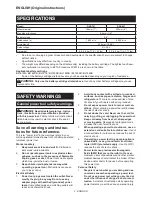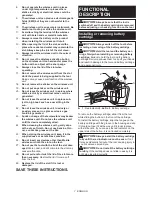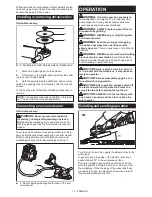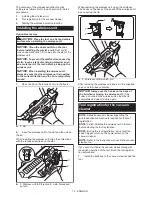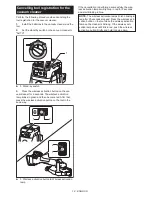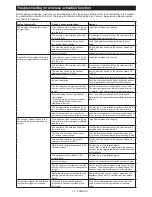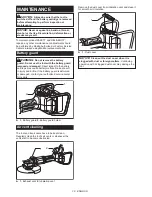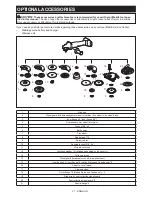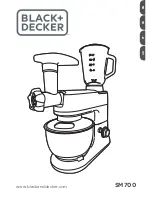
6 ENGLISH
18.
Cutting discs must not be subjected to any
lateral pressure.
19.
Do not use cloth work gloves during operation.
Fibers from cloth gloves may enter the tool, which
causes tool breakage.
SAVE THESE INSTRUCTIONS.
WARNING:
DO NOT let comfort or familiarity
with product (gained from repeated use) replace
strict adherence to safety rules for the subject
product. MISUSE or failure to follow the safety
rules stated in this instruction manual may cause
serious personal injury.
Symbols
The followings show the symbols used for tool.
volts
direct current
rated speed
revolutions or reciprocation per minute
Important safety instructions for
battery cartridge
1.
Before using battery cartridge, read all instruc-
tions and cautionary markings on (1) battery
charger, (2) battery, and (3) product using battery.
2.
Do not disassemble battery cartridge.
3.
If operating time has become excessively
shorter, stop operating immediately. It may
result in a risk of overheating, possible burns
and even an explosion.
4.
If electrolyte gets into your eyes, rinse them
out with clear water and seek medical atten-
tion right away. It may result in loss of your
eyesight.
5.
Do not short the battery cartridge:
(1)
Do not touch the terminals with any con-
ductive material.
(2)
Avoid storing battery cartridge in a con-
tainer with other metal objects such as
nails, coins, etc.
(3)
Do not expose battery cartridge to water
or rain.
A battery short can cause a large current
flow, overheating, possible burns and even a
breakdown.
6.
Do not store the tool and battery cartridge in
locations where the temperature may reach or
exceed 50 °C (122 °F).
7.
Do not incinerate the battery cartridge even if
it is severely damaged or is completely worn
out. The battery cartridge can explode in a fire.
8.
Be careful not to drop or strike battery.
9.
Do not use a damaged battery.
10.
The contained lithium-ion batteries are subject
to the Dangerous Goods Legislation require-
ments.
For commercial transports e.g. by third parties,
forwarding agents, special requirement on pack-
aging and labeling must be observed.
For preparation of the item being shipped, consult-
ing an expert for hazardous material is required.
Please also observe possibly more detailed
national regulations.
Tape or mask off open contacts and pack up the
battery in such a manner that it cannot move
around in the packaging.
11.
Follow your local regulations relating to dis-
posal of battery.
12.
Use the batteries only with the products
specified by Makita.
Installing the batteries to
non-compliant products may result in a fire, exces
-
sive heat, explosion, or leak of electrolyte.
SAVE THESE INSTRUCTIONS.
CAUTION:
Only use genuine Makita batteries.
Use of non-genuine Makita batteries, or batteries that
have been altered, may result in the battery bursting
causing fires, personal injury and damage. It will
also void the Makita warranty for the Makita tool and
charger.
Tips for maintaining maximum
battery life
1.
Charge the battery cartridge before completely
discharged. Always stop tool operation and
charge the battery cartridge when you notice
less tool power.
2.
Never recharge a fully charged battery car-
tridge. Overcharging shortens the battery
service life.
3.
Charge the battery cartridge with room tem-
perature at 10 °C - 40 °C (50 °F - 104 °F). Let
a hot battery cartridge cool down before
charging it.
4.
Charge the battery cartridge if you do not use
it for a long period (more than six months).
Important safety instructions for
wireless unit
1.
Do not disassemble or tamper with the wire-
less unit.
2.
Keep the wireless unit away from young chil-
dren. If accidentally swallowed, seek medical
attention immediately.
3.
Use the wireless unit only with Makita tools.
4.
Do not expose the wireless unit to rain or wet
conditions.
5.
Do not use the wireless unit in places where
the temperature exceeds 50°C (122°F).
6.
Do not operate the wireless unit in places
where medical instruments, such as heart
pace makers are near by.
7.
Do not operate the wireless unit in places
where automated devices are near by.
If oper-
ated, automated devices may develop malfunction
or error.
Summary of Contents for DGA901
Page 71: ...71 ...


